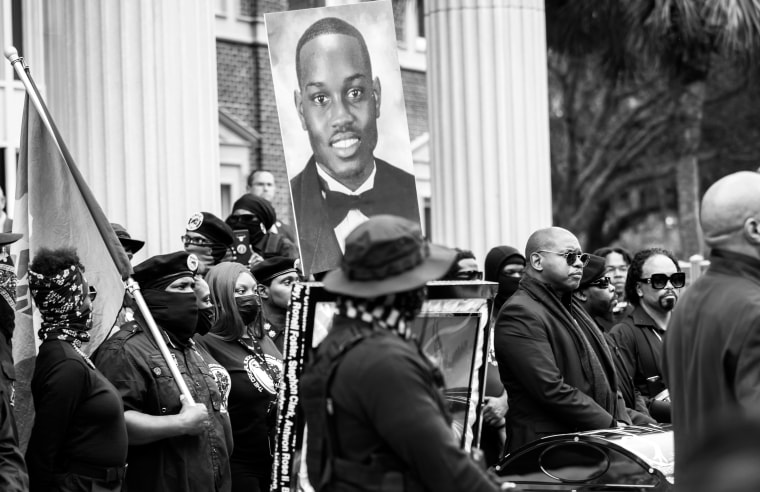For many, the televised trial of the three white men convicted of murder in the death of Ahmaud Arbery offered a unique view of the blatant racism that permeates U.S. courtrooms.
The defendants — Gregory McMichael, his son Travis McMichael and William Bryan — are now revealed as cruel racists motivated by the most venomous Black stereotypes.
They hired attorneys who spoke their language fluently, and those attorneys ran an overtly racist playbook from the beginning. They premised their clients’ arguments on an absurd self-defense claim in which they invoked a citizen’s arrest law used to capture enslaved people during the Civil War. They secured a nearly all-white jury to render judgment on their clients’ racist crimes, and they used racial rhetoric to do so. Even the judge said there appeared to be “intentional discrimination” during the jury selection process.
And when the trial began, some of the defense attorneys used the platform to express their own racist animus. To me, these felt like oddly revealing performances for defense attorneys. I know the nature of the job is to occasionally make arguments you may not agree with — but I also know that wasn’t the case here. These were people who seemed to sincerely believe in their clients’ right to hunt and kill Black people they presume to be dangerous.

One of Bryan’s attorneys, Kevin Gough, unsuccessfully tried to ban “high-profile African Americans” from the courtroom, including the Revs. Jesse Jackson and Al Sharpton, because he said they’d “intimidate” the jury.
“We don’t want any more Black pastors coming in here ... sitting with the victim’s family, trying to influence the jurors in this case,” Gough said.
Defense attorneys failed to win an acquittal in one of the most obvious lynching cases in recent memory.
Robert Rubin, one of Travis McMichaels’s attorneys, baselessly claimed Arbery had entered the neighborhood where he was killed for “nefarious purposes.”
One of Gregory McMichaels’s attorneys, Laura Hogue, suggested Arbery’s appearance justified her clients’ decision to hunt him down.
“Turning Ahmaud Arbery into a victim after the choices that he made does not reflect the reality of what brought Ahmaud Arbery to Satilla Shores in his khaki shorts with no socks to cover his long, dirty toenails,” Hogue told the jurors.
In the end, these arguments proved futile — defense attorneys failed to win an acquittal in one of the most obvious lynching cases in recent memory. But they succeeded in demonstrating that overt racism remains an alluring strategy, or an immutable characteristic, for some of America’s lawyers.
Related posts:
Kyle Rittenhouse trial was designed to protect white conservatives who kill
In a mixed verdict, white nationalists forced to pay millions in Unite the Right case
Ex-KKK leader David Duke takes credit for Donald Trump and Tucker Carlson
Head over to The ReidOut Blog for more.
